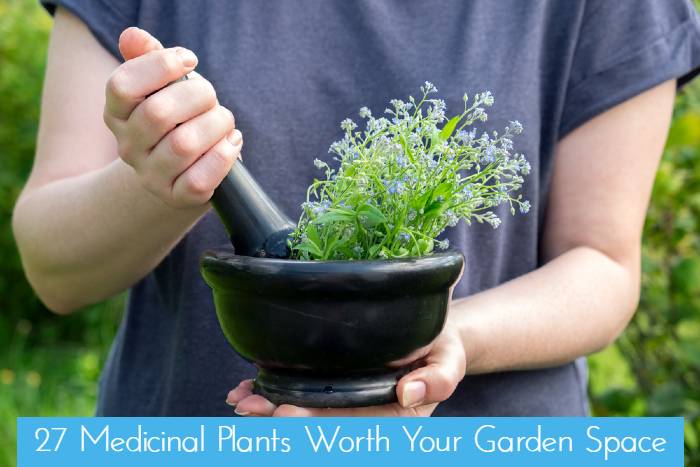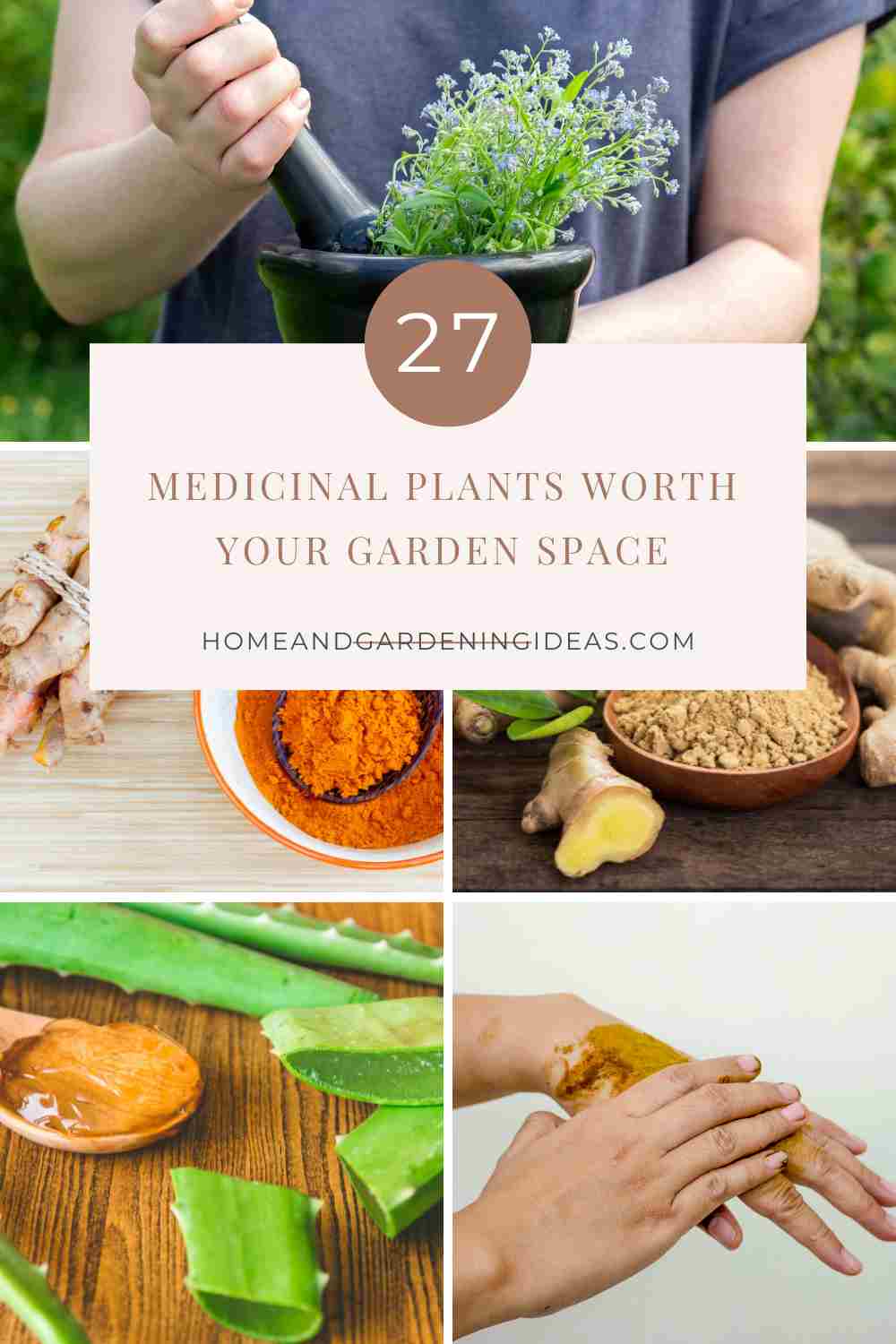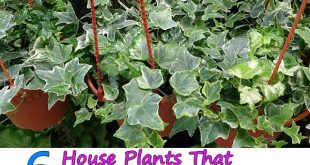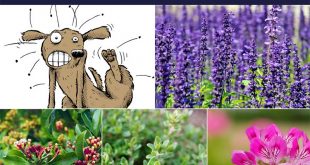27 Medicinal Plants Worth Your Garden Space
In the midst of the hustle and bustle of modern life, many people are seeking natural remedies for their health concerns. What better way to embrace nature’s healing powers than by growing your own medicinal plants in your garden?
Not only can these plants add beauty to your outdoor space, but they can also provide you with a range of therapeutic benefits. In this article, we will explore 27 medicinal plants that are worth dedicating some garden space for, specifically tailored for the USA audience.
1. Aloe Vera (Aloe barbadensis): Aloe vera is a succulent plant known for its gel-like substance that offers numerous medicinal properties. It is commonly used to soothe burns, heal wounds, and moisturize the skin. Growing aloe vera in your garden can provide you with a readily available source of this versatile plant.
2. Echinacea (Echinacea purpurea): Echinacea is renowned for its immune-boosting properties. It can help prevent and reduce the severity of the common cold and other respiratory infections. Planting echinacea in your garden can provide you with a natural defense against seasonal illnesses.
3. Lavender (Lavandula angustifolia): Lavender is a fragrant herb known for its calming effects. Its essential oil is often used to alleviate stress, promote relaxation, and improve sleep quality. Cultivating lavender in your garden can create a serene atmosphere and contribute to your well-being.
4. Peppermint (Mentha x piperita): Peppermint is a refreshing herb widely used to aid digestion and relieve headaches. Its leaves can be brewed into a delightful tea or added to culinary creations for a burst of flavor. Growing peppermint in your garden ensures a fresh and readily available supply.
5. Chamomile (Matricaria chamomilla): Chamomile is a gentle herb recognized for its soothing properties. It is commonly consumed as a tea to promote relaxation, relieve anxiety, and aid in sleep. Having chamomile plants in your garden allows you to enjoy a comforting cup of tea straight from your backyard.
6. Lemon Balm (Melissa officinalis): Lemon balm is a lemon-scented herb that offers calming and mood-enhancing effects. It can be used to reduce stress, anxiety, and promote a sense of well-being. Planting lemon balm in your garden can provide you with a natural remedy for relaxation.
7. Sage (Salvia officinalis): Sage is a versatile herb with antibacterial and anti-inflammatory properties. It is often used to treat sore throats, mouth ulcers, and other oral health issues. Having sage in your garden allows you to harness its medicinal benefits while adding flavor to your culinary creations.
8. Calendula (Calendula officinalis): Calendula, also known as marigold, is a vibrant flower with healing properties. Its petals can be used topically to soothe skin irritations, such as rashes and sunburns. Growing calendula in your garden adds a splash of color while offering a natural remedy for skin ailments.
9. Rosemary (Rosmarinus officinalis): Rosemary is a fragrant herb that not only enhances culinary dishes but also offers cognitive benefits. It has been associated with improved memory, concentration, and mood. Cultivating rosemary in your garden allows you to enjoy its aromatic essence and therapeutic effects.
10. St. John’s Wort (Hypericum perforatum): St. John’s Wort is a flowering plant widely used to alleviate symptoms of mild to moderate depression and anxiety. Its yellow blossoms add beauty to any garden, while its medicinal properties provide a natural mood-boosting remedy.
11. Marshmallow (Althaea officinalis): Marshmallow is an herb with soothing properties that can benefit the respiratory and digestive systems. Its roots and leaves can be used to make herbal preparations for coughs, sore throats, and digestive discomfort. Growing marshmallow in your garden provides you with an herbal ally for common ailments.
12. Milk Thistle (Silybum marianum): Milk thistle is a thorny plant that has been used for centuries to support liver health. It contains compounds that can protect the liver from damage and promote its regeneration. Including milk thistle in your garden allows you to tap into its liver-protective properties.
13. Yarrow (Achillea millefolium): Yarrow is a perennial herb with a long history of medicinal use. It has astringent and anti-inflammatory properties and can be used topically to promote wound healing and alleviate skin conditions. Planting yarrow in your garden offers a natural first-aid remedy at your fingertips.
14. Valerian (Valeriana officinalis): Valerian is a herb known for its calming effects on the nervous system. It is often used as a natural remedy for insomnia and anxiety. Cultivating valerian in your garden provides you with a reliable source of this soothing plant.
15. Ginger (Zingiber officinale): Ginger is a potent medicinal root with anti-inflammatory and digestive benefits. It can help alleviate nausea, aid digestion, and reduce inflammation. Growing ginger in your garden allows you to harvest fresh roots for culinary and medicinal purposes.
16. Turmeric (Curcuma longa): Turmeric is a vibrant yellow spice with powerful anti-inflammatory and antioxidant properties. It can be used to support joint health, reduce inflammation, and promote overall well-being. Including turmeric in your garden lets you enjoy its health benefits straight from the source.
17. Peppermint (Mentha x piperita): Peppermint is a refreshing herb widely used to aid digestion and relieve headaches. Its leaves can be brewed into a delightful tea or added to culinary creations for a burst of flavor. Growing peppermint in your garden ensures a fresh and readily available supply.
18. Dandelion (Taraxacum officinale): Dandelion is a resilient plant with diuretic and detoxifying properties. Its leaves and roots can be used to support liver health, promote digestion, and flush toxins from the body. Cultivating dandelions in your garden allows you to embrace their nutritional and medicinal value.
19. Nettle (Urtica dioica): Nettle is a plant that offers numerous health benefits. It is rich in vitamins, minerals, and antioxidants and can be used to alleviate allergies, support joint health, and promote overall vitality. Growing nettle in your garden provides you with a nourishing herbal ally.
20. Garlic (Allium sativum): Garlic is a well-known culinary ingredient with potent medicinal properties. It has antimicrobial, immune-boosting, and cardiovascular benefits. Including garlic in your garden not only adds flavor to your meals but also offers a natural defense against infections.
21. Oregano (Origanum vulgare): Oregano is a flavorful herb with antimicrobial properties. It contains compounds that can help fight off harmful bacteria and parasites. Cultivating oregano in your garden allows you to enjoy its culinary delights while harnessing its medicinal potential.
22. Passionflower (Passiflora incarnata): Passionflower is a beautiful flowering plant that has calming and sedative effects. It is often used to alleviate anxiety, promote relaxation, and improve sleep quality. Planting passionflower in your garden adds a touch of elegance while offering natural stress relief.
23. Catnip (Nepeta cataria): Catnip is a fragrant herb that has a calming effect on cats but can also be beneficial for humans. It can help soothe anxiety, relieve digestive discomfort, and promote relaxation. Growing catnip in your garden allows you to create a peaceful environment for both you and your feline friends.
24. Lemon Verbena (Aloysia citrodora): Lemon verbena is a citrus-scented herb known for its digestive and sleep-enhancing properties. It can help alleviate indigestion, reduce bloating, and promote restful sleep. Cultivating lemon verbena in your garden provides you with a refreshing and aromatic herb to support your well-being.
25. Witch Hazel (Hamamelis virginiana): Witch hazel is a shrub renowned for its astringent and anti-inflammatory properties. It is commonly used topically to soothe skin irritations, reduce inflammation, and promote wound healing. Including witch hazel in your garden allows you to harness its skin-healing benefits.
26. Mullein (Verbascum thapsus): Mullein is a tall, stately plant with respiratory-soothing properties. It can help alleviate coughs, congestion, and respiratory discomfort. Growing mullein in your garden not only adds visual interest but also provides a natural remedy for respiratory ailments.
27. Cat’s Claw (Uncaria tomentosa): Cat’s claw is a woody vine known for its immune-boosting and anti-inflammatory properties. It can support the immune system, reduce inflammation, and promote overall well-being. Cultivating cat’s claw in your garden allows you to tap into its medicinal potential.
Growing medicinal plants in your garden is a rewarding endeavor that offers both beauty and health benefits. These 27 medicinal plants provide a diverse range of therapeutic properties, from immune support to skin healing, stress relief to digestive aid.
By dedicating some garden space to these plants, you can create a natural pharmacy at your doorstep, ready to provide you with the healing power of nature. Embrace the art of gardening and let these medicinal plants enhance your well-being in the USA.
 Home and Gardening Ideas At home and Gardening ideas we believe inspiring readers about homesteading, self sufficiency
Home and Gardening Ideas At home and Gardening ideas we believe inspiring readers about homesteading, self sufficiency









